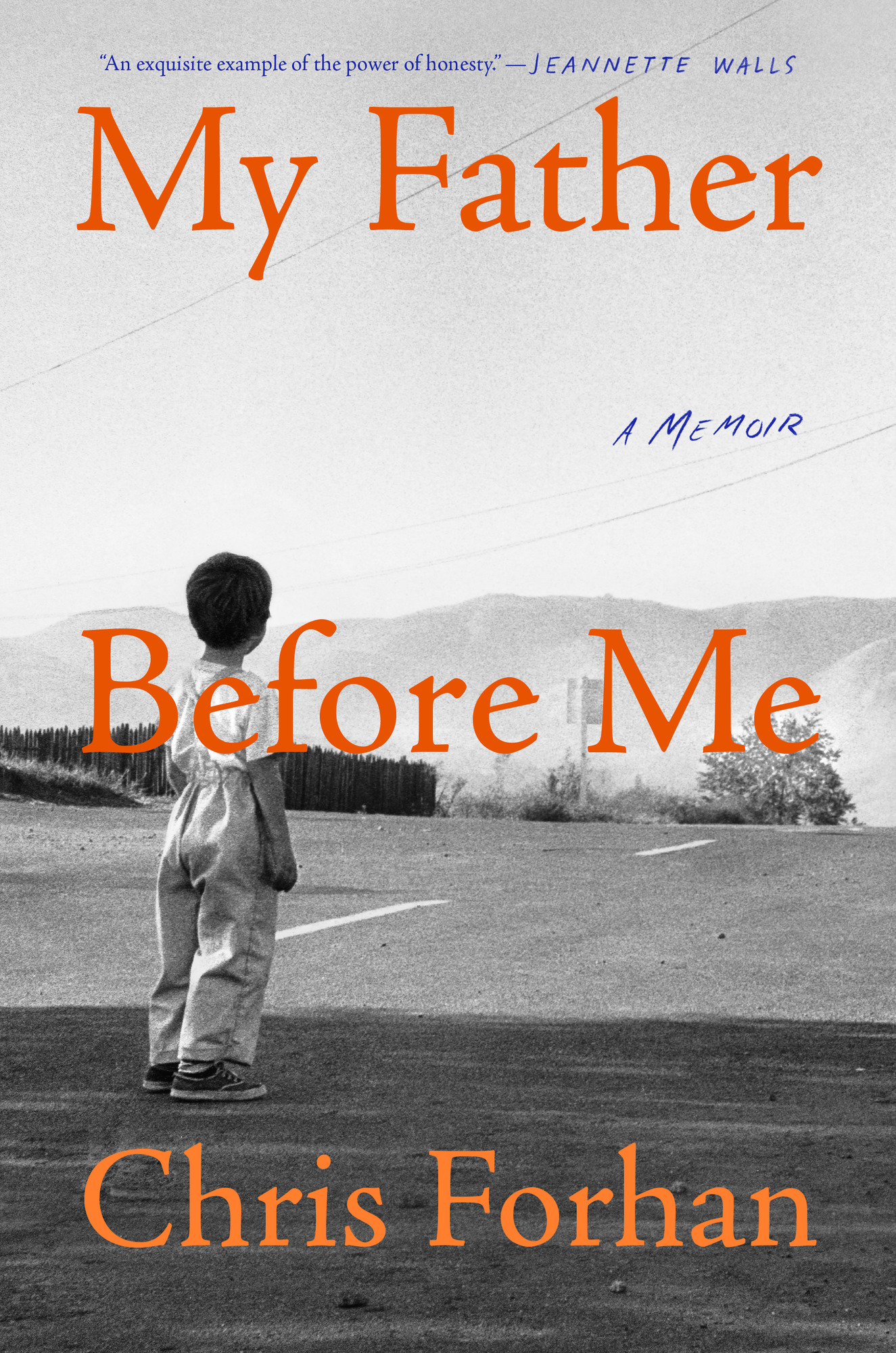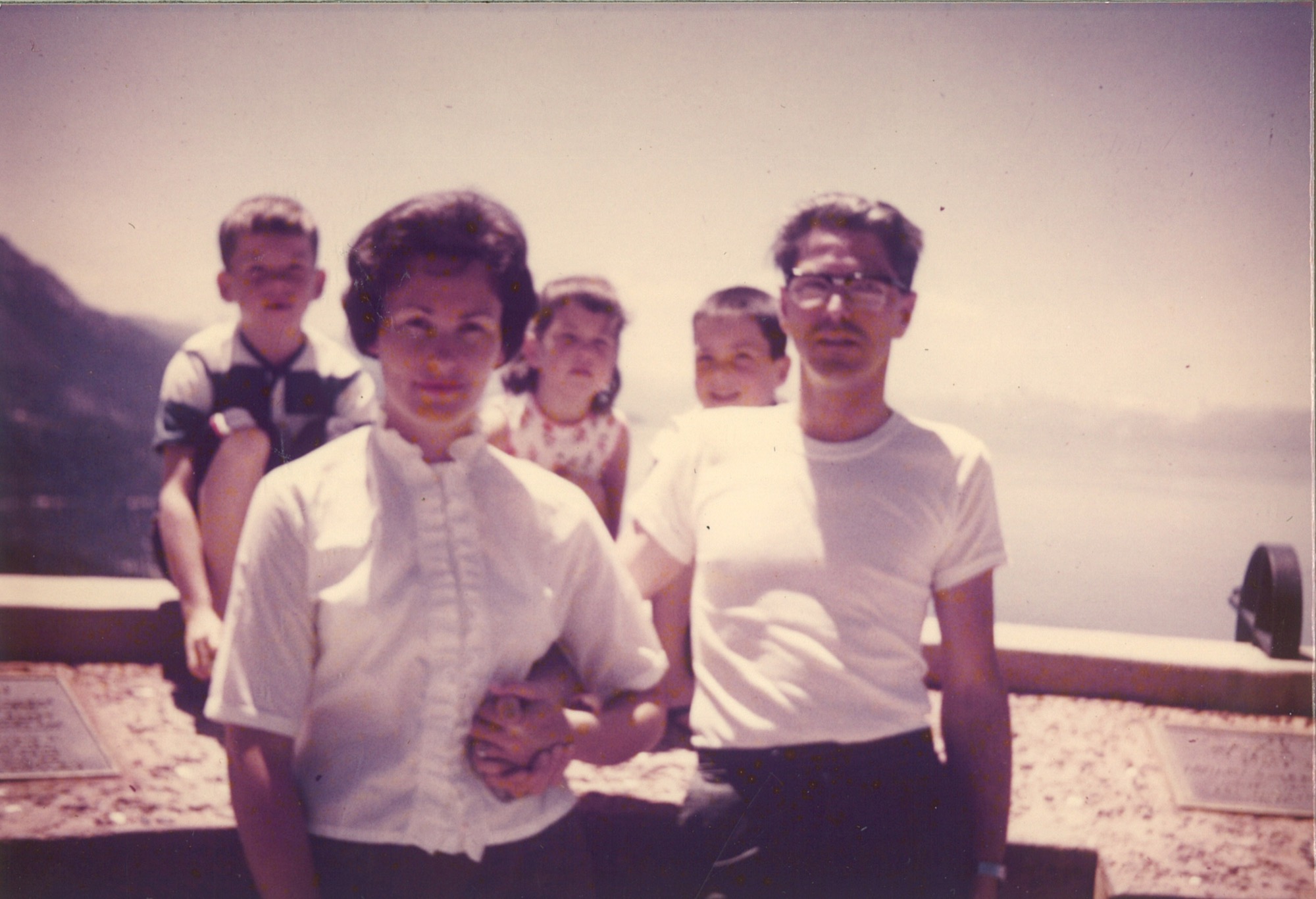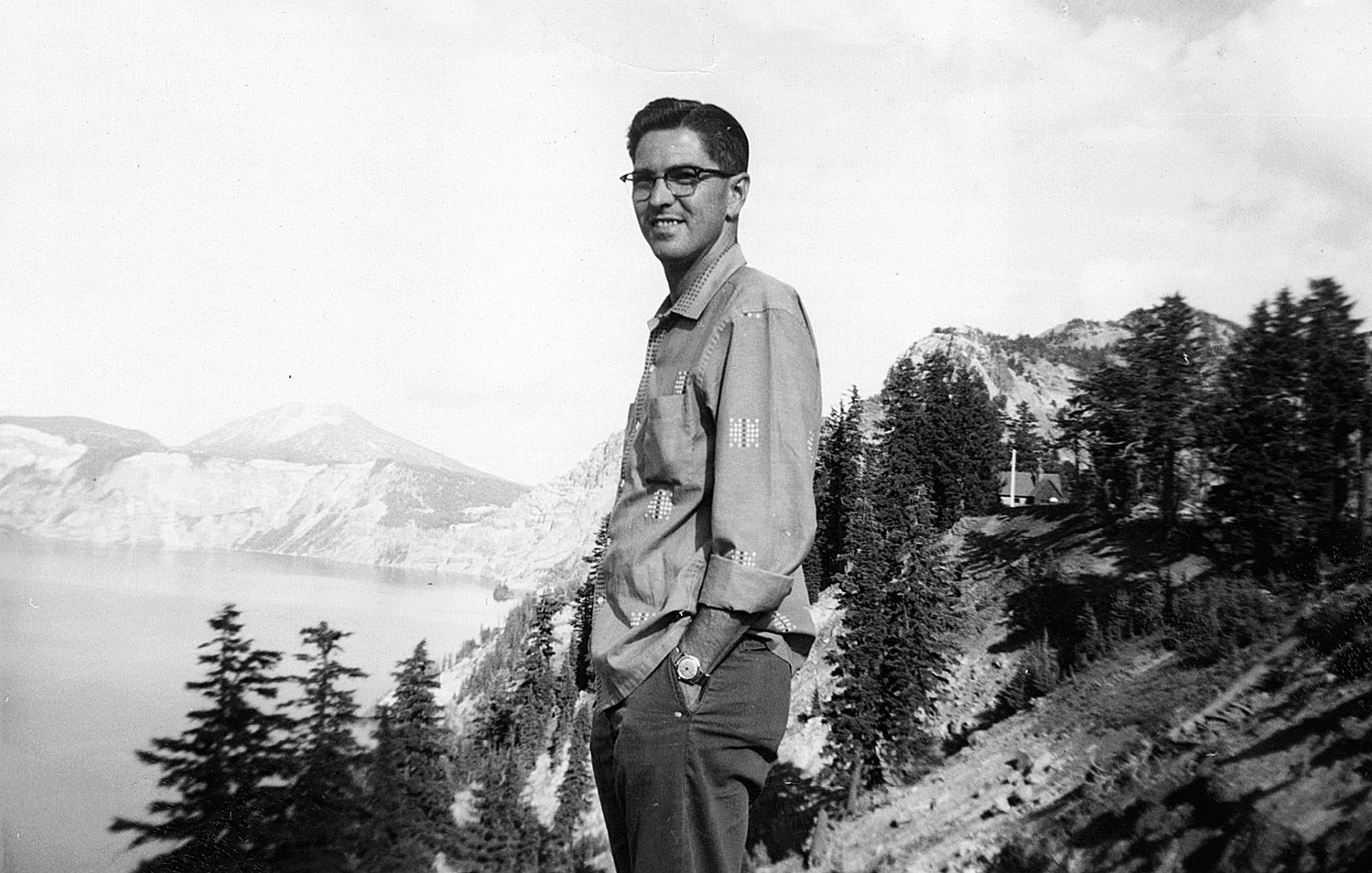My Father Before Me
Read My Father Before Me Online
Authors: Chris Forhan


Thank you for downloading this Scribner eBook.
Sign up for our newsletter and receive special offers, access to bonus content, and info on the latest new releases and other great eBooks from Scribner and Simon & Schuster.
or visit us online to sign up at
eBookNews.SimonandSchuster.com

Ange and Ed Forhan, in 1965, with their middle children: Kevin, Dana, and Chris

for Milo and Oliver
I cannot read that wretched mind, so strong & so undone.
âJOHN BERRYMAN, “DREAM SONG 145”
â Part I â
A Father's Son

1
I'm clinging to my father while he holds me loosely. I'm two, my head against his chest, his right arm around me; his other arm hangs at his side. He has carried me to the edge of an observation deck, to a metal railing only as high as his waist. He leans forward, gazing away from me. I grip his shirt. Thick orange steel girders jut out beneath us, unbudging sunrays. He lifts his free hand and waves at the world before us: a sprawl of tall buildings, exuberantly green and distant hills, the glittering silver blue of Puget Sound. My body slips a little; his hip and the crook of his arm support me, barely. Five hundred feet below, a sleek white train slides by in silence. I understand that my father means to drop me, to let me go, to watch my body tumble from the top of the Space Needle and shrink quickly from his view.
This is my earliest memoryâand a false one, of course. Of course. How could it not be? My young, stumbling mind, developing slowly, must have conflated several disconnected events and impressions and arrived at this fiction.
Forty years later, I mention it to my mother.
“Oh, that was true,” she says. “I remember. He made me very nervous, holding you close to the edge like that.”
* * *
1965. In the white Chevy station wagon, the family is driving south to Californiaâdays of spontaneous roadside picnics, the tailgate down, a makeshift table for little boxes of Sugar Pops and Frosted Flakes that you can open and pour the milk straight into. “I'm Henry VIII I Am” and “I Got You Babe” are the only songs on the radio. At Lake Tahoe, photos are taken; they will intensify my memory of this tripâor misshape it. In one, my little sister Dana and I stand side by side. She smiles beneath a white rubber bathing cap; surrounded by the pointed petal shapes at the cap's border, her face appears to be rising from the center of a flower. I wear blue plaid bathing trunks and a white terry-cloth shirt opened wide, hanging loose on my shoulders. I am five, but I look like a beach-town retiree.
And I can't swim: not in any photograph is the moment when I wade at the lake's lip, waves lapping at my ankles, then at my shins and knees. My balance shifts, I stumble, and I'm underâall around me, bright, churning, sunlit froth. I flailâwhich way is up?âand try not to swallow, then I'm coughing, lying on the sand.
Who has pulled me up and out of the water? Maybe my father, but all I remember of him on this trip is what remains, fixed and still and silent, in the photos: in black swim trunks, on a picnic bench, he sits alone in the sun, pale and narrow-shouldered but handsome, even strikingly so, his thick black hair brushed high off his forehead, his smile easy and open. Then, one leg crossed before the other, he leans, coolly, against our car, hand on one hip, cigarette dangling from his lip. Then, on a rock amid the shade of tall pines, he sits by himself again, staring off at something the camera can't show.
* * *
1968. It's a Saturday. My father needs to visit his downtown office for a few minutes. In a good mood, he agrees to take three of us kidsâmy older brother, Kevin; Dana; and meâto this other world of his, the
world he lives in when he's not with us, a world therefore glamorous and inscrutable.
The building is empty of people, the hallway dim. His office is closed, but he rattles the door open with his key, then clicks on the fluorescent lights. The room is huge, lined with filing cabinets and crowded with heavy desks, on top of which are typewriters and telephones and calculators and piles of paper and pen sets and small, upright framed photosâother people's families. He'll be just a minute. In the meantime, okay, yes, we can play with the Xerox machine, but carefully.
Hesitantly, one of us pushes the start button. The machine jerks awake; on its top, a bar of green light glides beneath glass. With borrowed office pens, we draw pictures of animals, set them upside down on the glass, and photocopy them. We copy a pile of paper clips. We copy the bottom of a saucerâthe imprint of its originsâhard to make out in the resulting shadow. Then we copy ourselves, or parts of us: our palms and outstretched fingers, the backs of our hands, our faces, eyes squinched shut against the light.
* * *
1971. Our bikes have been stolenâthree of them: new ten-speeds, chrome spokes and fenders still shimmering. While we were away from home, some brazen bandits entered our breezeway, a shadowy space hidden from street view, and rode off with them.
Our father, who has been taught that if you want something, you work for it, has a solution: he will not pay for replacement bikes. Instead, he will hire Kevin, Dana, and me to do odd jobs around the house, and we will earn the money ourselves. All summer, I keep a chart recording my labors and the time I have devoted to completing them, handing it to my father in the evening so he can initial each entry and signify his approval. During one two-day stretch, desper
ate for that bicycle, I weed the sandbox and garden, mow the lawn, sweep the playhouse, clean and arrange the storage shed, burn a heap of branches, and babysit my two little sisters. All of this takes me seven hours and forty minutes. I dutifullyâand proudlyârecord the figure on my chart and bring it to my father. He holds the chart before him, examining it, then says, “Hmmm.” He slips a pen from his shirt pocket, draws a neat line through my figure, and jots a revised one beside it. “I'll give you six hours.”
My shoulders slump. “But it took me almost two hours more than that,” I complain. “It did, really.”
“Six hours. A boy can do this work in six hours.”
My plan for the summer has been to accumulate one hundred hours of work. As the weeks disappear behind me and the days shorten, my goal begins to seem Sisyphean. How long must I continue to work? When will my reward come?
* * *
1973. Our father has been fired from his job, the one that has consumed and frazzled him for fifteen years, the one that, for months, he has been too distracted, too depressed, too sick, too
something
to perform adequately. The company, drained of patience, has let him go. It's a relief. His severance package is generous; he has months, if necessary, to persuade another firm to take him on, and, until then, we will have our dad back, and our mom will have her husband. One of the first things he does with his sudden free time is take a few of us kids to the most popular movie of the year, the one we've been longing to see:
The Poseidon Adventure
. We sit side by side in our plush seats, munching popcorn, slurping 7-Up and Orange Crush, while a massive wave washes over an ocean liner, capsizing it, transforming the ceiling of the ship's vast ballroom into a floor, dozens of New Year's revelers crashing to it, then lying dead or injured. We watch a small crew of
plucky survivors decide to try to escape the ship by climbing up to the hull, which is floating atop the water. We munch and slurp as they raise a giant Christmas tree and employ it as a ladder, climbing high above the floor, which is beginning to fill with water. Other survivors beneath them, oblivious to the severity of the crisis, have jeered at the escape plan; they are extras, minor characters paid to die early. Suddenly desperate, a flood rising around them, they leap at the tree, dragging it down, and themselves down, into the deepening water.
2
Six months later: my father is dead. He has ended his own life, doing it while sitting behind the wheel, going nowhere.
Three days before Christmas, in the middle of the night, while his wife and children slept, Edward Forhan drove home from who knows whereâwe rarely knew where he wentâparked his white Dodge Dart in the carport, ran a garden hose from the exhaust pipe to the driver's-side window, slipped inside, breathed, then breathed, then breathed, then stopped breathing. He was forty-four. He left no note.
I was fourteen. What did I know of him? He was a dad. He did what dads do: put on a suit and tie, say goodbye, walk out the front door carrying his briefcase, and drive downtown to the office. “Awr-fuss,” he'd say. “Where're you going, Dad?” “Awr-fuss”âmaybe mocking the way one of his kids pronounced it, maybe mocking the office itself. At the end of the day, he would come home for dinner. Or maybe he wouldn't, in which case his unused plate, fork to the left of it, knife and spoon to the right, gleamed meaningfully on the table at his place across from our mother's, while we children ate. We waited for the click and creak of the downstairs door opening, hoping not to hear itâhoping not to hear whatever argument or seething silence and slammed doors might followâbefore we finished our meal and escaped to the refuge of our separate bedrooms. On weekends he made pancakes for the familyâ
sometimes, in his better moods, pouring the batter onto the griddle in funny shapes: a rabbit, a dog. At ease, he would grin, eyes twinkling, and deliver a goofy wisecrack or slip into a punny riff, riding an agreeable wave of Irish humor. His laugh was a guffaw, bursting from him, loud, free, a crescendo that ended on a high, held note:
Ah-HAAA!
Every morning he sat on the toilet seat in his underwear and stabbed his thigh with a hypodermic needle filled with insulin. Occasionally, unexpectedly, while planing a piece of wood on the patio or painting a deck railing or, worse, driving, he would begin to speak oddly, as if to himself, then more loudly, rapidly, manically. His movements would become fast and agitated, and when we spoke calmly and with concern to him, he ignored us or reacted with a dismissive laugh. He was the other dad then, having a diabetic reaction; someone would have to inveigle him to down a glass of orange juice or eat a chocolate bar. Downstairs, he kept a workbench with a vise and drill and hammers and tidy rows of jars filled with screws and rivets. He procured some old railroad ties, heavy and splintery, and built a sandbox out of them in the backyard. When we outgrew our swing set, he transformed it into a playhouse, using the metal posts as a triangular frame, laying sheets of wood on them for walls and fashioning a small door out of plywood that he attached with hinges and painted blue. He drove his children to professional baseball games and basketball games and sat quietly in the stands, sipping a beer from a big waxed paper cup and methodically shelling peanuts he lifted one by one from a plastic sack. He smoked Tareytons. He broke briefly into song: “Oh, look-a there, ain't she pretty. She looks like a beautiful wax doll. . . .” Feeling put upon, he muttered, “For cryin' in the beer” or “For the love of Mike.” Feeling cheated, he complained, “That's dirty pool.” “He's got running off at the mouth,” he'd say of some indiscreet gossip. He taught us once, because we asked, about the solar system, all that distant, intricate orbiting. He looked a little like Gregory Peck: the strong brow,
the rich dark hair, the lean frameâless the composed and bookish Peck of
To Kill a Mockingbird
than the distracted, disquieted one of
Spellbound
. When he died, he had been married twenty-four years. He had fathered eight children.
And who had fathered him? He didn't speak of his parents, whom we never met. I knew his grandmotherâhis mother's mother. We called her Grandma; she was the only person from his side of the family whom I knew, and I never wondered much about the others. I was a child; what mattered was the present that I was part of, the world of people that I'd been plopped into. Anything that happened to my parents before I was born might as well have occurred when toga-clad men ambled among marble fountains, nibbling figs. We did hear of a brother my father once had who died young; there was another brother who lived far away, whose wife sometimes sent us Christmas cards. But what had become of my dad's mother and father? Who were these absent grandparents of mine? When I was eight, I carried my Bear Scout handbook to the dining room table and showed it to my mother, opening it to the page that contained the diagram of a family tree, with blank spaces for names. I was working on a genealogy merit badge; I preferred any badge I could earn without doing squat thrusts or hiking through woods with a pocketknife and a length of rope. In the handbook, I had printed my name and those of my parents, but after that I was stuck. My mother told me that my father's parents' names were Nathaniel and Bernadine and that Nathaniel's mother's name was Marie and his father's nameâwell, she didn't know for sure. Forty years later, as I tried a second time to fill in those blanks, I discovered that my father's grandmother's name was not Marie but Ellenâmy mother hadn't even been closeâand my great-grandfather's name was Thomas. My father clearly didn't talk much to his wife about his family, and it says something that, in trying to earn that badge, I didn't ask him to talk to me, either.
Around the time I turned the age my father was when he died, I began to wonder more seriously about himâor, more accurately, feelings associated with him began erupting, in dreams, in poems. I wrote a book of poems that centered on my childhood and the loss of my father, but he remained, in that book, the dad whom an eight-year-old or twelve-year-old might know: the briefcase-carrying breadwinner, the mute figure in the easy chair thumbing through the evening paper, a mannequin, a phantom, half absent already, and silent.
But he was here once and was real, my father in the flesh, a man holding his son in his arms. I try to recall him exactlyâthe timbre of his voice, some precise gesture with his hands as he spoke, the smell of cigarette smoke on his sweater. But he's a scattering of fragments, shreds of memory I have lived with so long that, no matter how I gather and shape them, they constitute less my father than some idea that, long after his death, he has come to representâabout absence, about solitude, about secrecy, about time, about memory itself.
I begin to ask questionsâof my mother, of my siblings, of any acquaintances of my father or relatives previously unknown to me whom I might track down. In my fifties, I, too, have become a father, of two small boys. I would not willingly abandon them ever, let alone abandon them without a word, and permanently. How did my father become a man who, halfway through his life, could decide he'd had enough of that life and leave itâand his wife and eight children, the youngest of them only five years oldâwithout explanation?
And who am I, so restless for those answers, so restless to write them down?